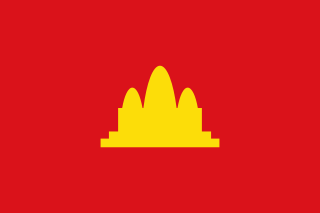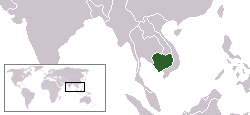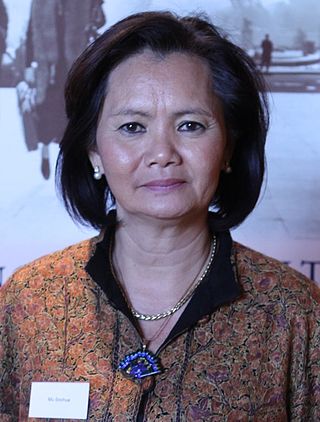
The Khmer Rouge is the name that was popularly given to members of the Communist Party of Kampuchea (CPK) and by extension to the regime through which the CPK ruled Cambodia between 1975 and 1979. The name was coined in the 1960s by then Chief of State Norodom Sihanouk to describe his country's heterogeneous, communist-led dissidents, with whom he allied after his 1970 overthrow.

Lesbian, gay, bisexual, and transgender (LGBT) persons in Cambodia face legal challenges not experienced by non-LGBT residents. Same-sex sexual activity is legal in Cambodia. Cambodia provides no anti-discrimination protections for LGBT people, nor does it prohibit hate crimes based on sexual orientation and gender identity.

Somaly Mam is a Cambodian anti-trafficking advocate who focuses primarily on sex trafficking. From 1996 to 2014, Mam was involved in campaigns against sex trafficking. She set up the Somaly Mam Foundation, raised money, appeared on major television programs, and spoke at many international events.
The Acid Survivors Foundation is a Bangladeshi non-governmental organisation dedicated to raising awareness and preventing acid attacks and providing survivors with medical and legal aid.
Cambodian Children's Fund (CCF) is a non-profit organisation, founded in 2004 by Scott Neeson to help children in Steung Meanchey, one of the poorest areas in Cambodia’s capital Phnom Penh. Initially established to support 45 children in need, CCF now educates over 2,000 children. In addition, it serves 12,000 people in the communities where it works through a range of community outreach, healthcare, childcare and vocational training programs.
The Cambodian Human Rights and Development Association (ADHOC) is Cambodia's oldest human rights organization. It was founded by a group of former political prisoners, led by Thun Saray in December 1991, shortly after the signing of the 1991 Paris Peace Agreements, which put an end to the long-running Cambodian Civil War.

Kampuchea, officially known as Democratic Kampuchea from 5 January 1976, was a one-party totalitarian state which encompassed modern-day Cambodia and existed from 1975 to 1979. It was controlled by the Khmer Rouge (KR), the name popularly given to the followers of the Communist Party of Kampuchea (CPK), and was founded when KR forces defeated the Khmer Republic of Lon Nol in 1975.

The quality of health in Cambodia is rising along with its growing economy. The public health care system has a high priority from the Cambodian government and with international help and assistance, Cambodia has seen some major and continuous improvements in the health profile of its population since the 1980s, with a steadily rising life expectancy.

Mu Sochua is a Cambodian politician and rights activist. She was a Member of Parliament (MP) for Battambang from 2013 to 2017, a seat which she previously held from 1998 to 2003. She was a member and Vice President of the Cambodia National Rescue Party (CNRP) until its dissolve, and previously a member of the Sam Rainsy Party (SRP) prior to its merger with the Human Rights Party. As a member of FUNCINPEC, she also served as Minister of Women and Veterans' Affairs in Hun Sen's coalition government from 1998 to 2004. She is currently one of 118 senior opposition figures serving a five-year ban from politics following a court ruling on 16 November 2017.
Acid Survivors Trust International (ASTI) is a UK-based international non-profit organization aiming to end acid and burns violence at a global level. In addition to public education and awareness campaigns, ASTI supports organizations in Bangladesh, Cambodia, India, Nepal, Pakistan and Uganda that they have helped to form. The organization was founded in 2002 and is a registered charity under English law.
Calmette Hospital or L'hôpital Calmette, located on Monivong Boulevard in Phnom Penh, is a public hospital managed by Ministry of Health and funded by the Cambodian and French governments. It is considered as Cambodia's flagship health care centre. The name of the hospital was derived from Albert Calmette, a renowned French bacteriologist.

Kao Kim Hourn is the current Secretary-General of the Association of Southeast Asian Nations (ASEAN). He previously served as a two-term Minister Delegate attached to the Prime Minister of the Kingdom of Cambodia. Dr. Kao, his formal Cambodian name, is a Member of the Supreme National Economic Council, Senior Fellow at the Jeffrey Cheah Institute on Southeast Asia, and a Member of the Global Council of The Asia Society.

An acid attack, also called acid throwing, vitriol attack, or vitriolage, is a form of violent assault involving the act of throwing acid or a similarly corrosive substance onto the body of another "with the intention to disfigure, maim, torture, or kill". Perpetrators of these attacks throw corrosive liquids at their victims, usually at their faces, burning them, and damaging skin tissue, often exposing and sometimes dissolving the bones. Acid attacks can lead to permanent, partial, or complete blindness.
Christopher Minko is an Australian musician and co-founder of the Phnom Penh-based Delta blues group called Krom. Living in Cambodia since 1996, Minko is also the founder and Secretary General of the Cambodian National Volleyball League (Disabled) NGO also known as CNVLD.

The Cambodian League for the Promotion and Defense of Human Rights, commonly known by its French acronym LICADHO, is a national Cambodian human rights non-governmental organization (NGO) established in 1992. It is based in Phnom Penh and also operates 12 provincial offices. LICADHO's activities focus on monitoring human rights violations, providing legal representation to victims of human rights abuses and providing humanitarian assistance to victims of human rights abuses. The organization also monitors 18 Cambodian prisons and has specialized programs for the protection of women's rights and children's rights. LICADHO is regularly cited in the Cambodian media for stories on local human rights issues. The organization has also received international coverage for its work to combat human trafficking and prisons, and has been particularly vocal in highlighting Cambodia's land-grabbing crisis since 2003. Current LICADHO director Naly Pilorge has authored a number of op-eds in major international media outlets publicizing the human rights situation in Cambodia. LICADHO was the sole Cambodian rights organization invited to testify at a 2013 US House of Representatives subcommittee hearing on Cambodia's "looming political and social crisis".
The Children's Surgical Centre (CSC) is a non-profit, non-governmental, and non-religious surgical hospital in Phnom Penh, Cambodia and registered as a 501(c)(3) in the United States. Founded in 1998, the centre aims to improve the quality of life for disabled children and adults by providing free rehabilitative surgery.
Louvain Coopération is a Belgian International non-governmental organization (INGO) located in the university city of Louvain-la-Neuve. This organization is a member of the Federation of Development Cooperation NGO (Acodev). The NGO was founded by members of the University of Louvain (UCLouvain) and is an important part of the Belgian universities NGO grouping (Uni4coop), It operates on an annual budgetary basis of around €8 million, and is active in about 40 projects distributed in nine countries of the world, if you count Belgium. Its fields of activity are: health, including mental health and in specific gender-related contexts, food security, microeconomy, mutual organization and international solidarity.

Gambling in Cambodia is officially illegal under the 1996 Law on Suppression of Gambling, which outlawed all unauthorized forms of gambling and provided for penalties ranging from monetary fines to short prison sentences, although the Cambodian government's General Department of Prisons does not list gambling as one of the 28 offenses punishable by imprisonment.
The Embassy of France in Cambodia is the primary diplomatic mission of the French Republic to the Kingdom of Cambodia. It is located in the capital Phnom Penh. It is known for the role it played as a place of refuge for foreigners and at-risk Cambodians after the Khmer Rouge takeover for several days until foreigners were forced to go to Thailand while the regime forced Cambodians to stay in the country.
Ros Sopheap is a Cambodian women's rights activist. She is the founder and former executive director of Gender and Development Cambodia (GADC), a non-governmental organisation involved in preventing domestic violence against women and promoting women in leadership roles. During her 20-year career with GADC, she advocated on behalf of women in Cambodia and was central to the Cambodian women's rights movement. Sopheap also served as the president of the Committee to Promote Women in Politics.










